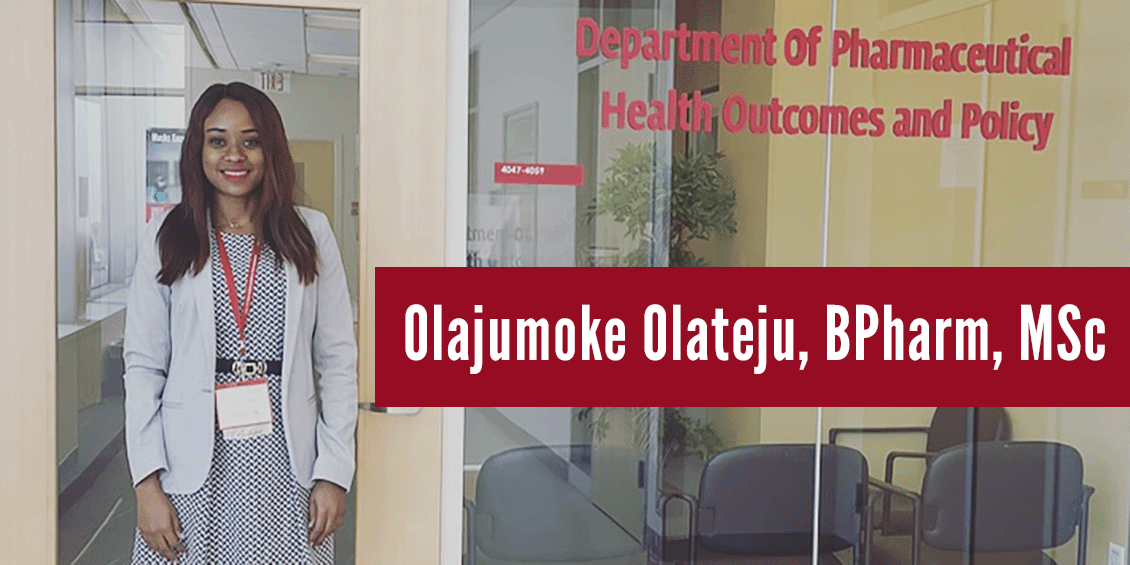Inspired by her countrywoman’s success in saving countless lives by cleaning up the rampant, deadly fake drug trade in her native Nigeria, University of Houston College of Pharmacy (UHCOP) Ph.D. candidate Olajumoke Olateju, BPharm., MSc., is working to shed light on disparities and barriers in population health that keeps effective care out of arm’s reach for many patients.
"I choose to study pharmacy because it offers a unique opportunity to influence policies that improve medication access and utilization, impacting a large number of people simultaneously," Olateju said.
Growing up, Olateju witnessed the devastating effects of the fraudulent drugs trade. According to a report by the United Nations, fake medicines kill almost 500,000 sub-Saharan Africans every year. Many of these drugs are labeled as humanitarian aid and, given that the region hosts the largest percentage of malaria and HIV cases in the world, the fake drug business is as lucrative as it is deadly.
But, in the early 2000s, pharmacy expert Professor Dora Akunyili was appointed to lead the Nigerian equivalent of the Food and Drug Administration.
"She did an amazing job cleaning up the drug supply chain system," Olateju said. "Her tenure led to the enactment of policies and measures against drug counterfeiting, and the outcomes were amazing."
The late Akunyili's example inspired Olateju to become a pharmacist and pursue a specialization in the field of pharmaceutical health outcomes and policy (PHOP).
"I wanted to study pharmacy so that I could make impactful changes like Dr. Akunyili," Olateju said. "Her work was very inspiring, and I realized that policy could have a significant impact on a larger group of people."
Public health exposure
After earning her bachelor’s degree in pharmacy and her M.S. degree in pharmaceutical chemistry, Olateju took an adjunct faculty position where she trained pharmacy technicians in her home country before joining a U.S.-based organization that implements health programs in several countries.
In her new role, Olateju worked as a pharmacist to coordinate the distribution of anti-malaria drugs and diagnostic test kits across hundreds of health facilities. She collected and analyzed health data across all tiers of the health care system, contributed to the development of malaria treatment guidelines, and supported the local government and affiliates to strengthen their health systems.
Her work stimulated an interest in population health and inspired by her idol's doctoral education, Olateju seized on a friend's recommendation to apply to UHCOP and continue her education.
Impact of mentorship
"I appreciated the diverse research endeavors undertaken by faculty at PHOP," said Olateju, citing the work on HIV education and awareness by UHCOP Professor E. James Essien, M.D., Dr.PH. "This resonated with me due to my previous experience."
Coming up to her fourth year at UHCOP, she has no regrets about her decision.
"I am really happy that I made the decision to come to the University of Houston," Olateju said. "It has really been amazing because they empower us to be independent researchers and critical thinkers, while also nurturing our collaborative skills."
Under the mentorship of her adviser, UHCOP Associate Professor Douglas Thornton, Pharm.D. Ph.D., Olateju has contributed to several research projects.
"With the right mentorship, you can go far here at UHCOP," Olateju said. "In my first year, I was able to conduct research that has been published in reputable oncology journals. Dr. Thornton has helped me hone my skills in cancer research and expanded my focus to substance use disorder, another issue of public health relevance."
Putting innovation to work
Olateju’s doctoral research focuses on two disease states: cancer and substance abuse disorder.
She has developed a particular interest in cancer immunotherapy, recognizing its transformative impact on cancer care and its expanding indications across various cancer types. Her current research focuses on investigating differential responses to immunotherapy, as not all patient populations benefit from it, despite its proven effectiveness. Identifying these response variations can assist clinicians in making more informed treatment decisions and enable them to pinpoint which patients are likely to benefit from specific drugs or therapies.
"My next objective is to unravel complexities associated with the use of immune checkpoint inhibitors (a type of immunotherapy that helps the body’s immune system fight cancer) for lung cancer, given that not all patients respond to this therapy," Olateju said. "By identifying risk factors for poor response to immunotherapy across diverse patient populations, my research aims to guide clinical decision-making, promote judicious use of these expensive drugs, and inform future oncology drug development efforts.
"Population outcomes are very dear to my heart. My core interest is to work at the population level, so I can evaluate the patient health and the disparities that exists in the system."
Trending success
During her time at UHCOP, Olateju has won Best Podium Presentation awards at the Southern Pharmacy Administration Conference in 2022 and the American Pharmacists Association Annual Meeting & Expo in 2023. She has received travel support to present her research, including an ISPOR Student Travel Grant and UH Cullen Fellowship Travel Grant, as well as a scholarship from the Nigerian Association of Pharmacists and Pharmaceutical Scientists in the Americas (NAPPSA). She also has been inducted into the Phi Kappa Phi multidisciplinary collegiate honor society and the Rho Chi Society.
Future plans
For the future, Olateju just wants to be in a position where she can conduct high-quality, impactful research. She wants to help identify problems in a population’s health and assess the needs to help create policies that can improve the population’s health and identify the most effective treatments.
“I arrived with little prior knowledge about many of the things that I’m now proficient in, but thanks to the training I’ve received, I’ve been able to accomplish a great deal,” she said.
